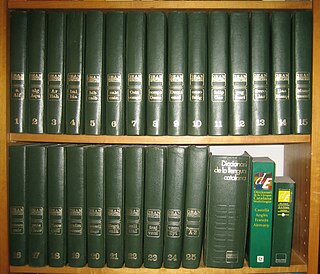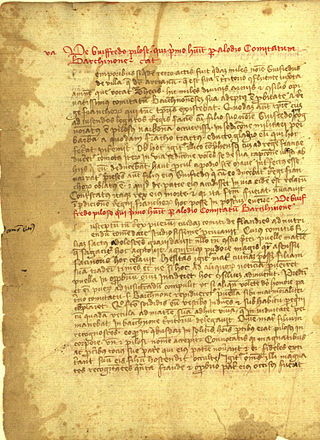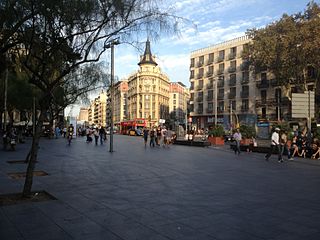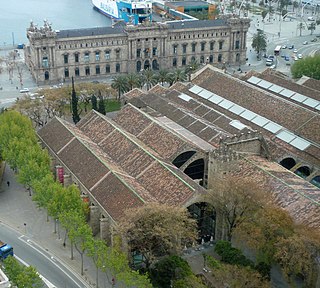
Les Fonts is a neighbourhood in Terrassa in the comarca of Vallès Occidental, located in Barcelona, Catalonia, Spain.

Les Fonts is a neighbourhood in Terrassa in the comarca of Vallès Occidental, located in Barcelona, Catalonia, Spain.
As of 2009, the population is 2,336. [1] The postal code is 08228.
The town is served by the Les Fonts station of the FGC line S1. [2]
The name Les Fonts is Catalan for The Fountains.

Gran Via de les Corts Catalanes, more simply known as Gran Via, is one of Barcelona's major avenues. With a length of 13.1 km (8.1 mi), it is the longest street in Catalonia and the 2nd longest in Spain, after Gran Vía de la Manga, in La Manga del Mar Menor, but is the one with most street numbers in Spain.

The Battle of Llucmajor occurred in 1349 when Peter IV of Aragon's forces defeated and killed his cousin James III of Majorca in the town of Llucmajor on the Balearic Islands, resulting in the end of the independent Kingdom of Majorca.

The Barcelona–Vallès Line is an unconnected standard gauge rapid transit and commuter railway line linking Barcelona with Sabadell and Terrassa via the Collserola mountain range, in Catalonia, Spain. Its name refers to the Catalan historical region of Vallès, whereby most part of the line runs. Plaça de Catalunya station serves as the Barcelona terminus of the line, where almost all its trains either start or terminate. The line then continues northwards and branches off twice before leaving the city limits. Its main route splits in two in Sant Cugat del Vallès, forming two major branches to Sabadell and Terrassa. It has 40 passenger stations in operation and a total line length of 48.1 kilometres (29.9 mi).

Plaça de Francesc Macià is a square in Barcelona, Catalonia, Spain. Located in one of the main business areas of the city, it is one of the most transited points of Barcelona. It is crossed by Avinguda Diagonal and several other major thoroughfares: Avinguda de Josep Tarradellas, Travessera de Gràcia, Carrer del Comte d'Urgell and Avinguda de Pau Casals. It is part of the Sarrià-Sant Gervasi district, even though it borders two other districts of Barcelona: Les Corts and Eixample.
Pokr Sepasar is a village in the Ashotsk Municipality of the Shirak Province of Armenia.

Acharkut is a village in the Ijevan Municipality of the Tavush Province of Armenia.

The Gran Enciclopèdia Catalana is a Catalan-language encyclopedia, started in fascicles, and published in 1968 by Edicions 62. The soul of the work was written by Max Cahner, and the first director was Jordi Carbonell. From the second volume the work had its own publisher: Enciclopedia Catalana SA with Jordi Pujol, and the new director was Joan Carreras i Martí.

The Gesta comitum Barcinonensium is a Latin chronicle composed in three stages by some monks of Santa Maria de Ripoll and recounting the reigns of the Counts of Barcelona from Wifred I (878–97) to James II (1291–1327), as late as 1299. It is the fawning history of the dynasty known as the House of Barcelona. In presenting the rulers of the county of Barcelona as the descendants of Charlemagne, the monks sought to justify their independent policy with respect to the King of France, their nominal sovereign. The Gesta is the chronological backbone.

Ronda de la Universitat is a major thoroughfare of central Barcelona, Catalonia, Spain, in lower side of the Dreta de l'Eixample, in the Eixample district. It links two of the city's three main squares, running from Plaça de Catalunya towards Plaça Universitat. There it meets Gran Via de les Corts Catalanes and Ronda de Sant Antoni begins. It's essentially the same street as Ronda de Sant Pere, which follows it right after Plaça de Catalunya. As the other ronda, it follows the original outline of the medieval city walls, particularly the wall of Tallers, above the area nowadays known as Raval, where a road called Carrer de Tallers runs partially parallel to it. Ronda de la Universitat was paved in 1872. It takes its name from the Universitat de Barcelona, which has had its main building at Plaça Universitat since the 19th century. Before its current name was approved in 1989, its official name was in Spanish: Universidad. The Biblioteca Judicial de Catalunya is on this street.

The Plaça de la Universitat is one of Barcelona's central squares, at the border between the districts of Eixample and Ciutat Vella. It is located at the intersection of Gran Via de les Corts Catalanes, Carrer d'Aribau and Ronda de Sant Antoni. It is also just west of Plaça de Catalunya, to which it is linked by the Ronda de la Universitat and Carrer de Pelai.

Les Tres Torres is a residential neighbourhood in the inland Sarrià-Sant Gervasi district of Barcelona, Catalonia (Spain).

Font de Canaletes is an ornate fountain, crowned by a lamp post, in Barcelona, Catalonia, in Rambla de Canaletes, the upper part of La Rambla, near Plaça de Catalunya.

The Matarranya is a river in the provinces of Teruel and Zaragoza, Aragon, Spain. It begins its course at 1,200 m northeast of the Tossal d'Encanader, Ports de Beseit. limestone massif near La Pobla de Benifassà.

Villefranche-de-Rouergue is a railway station in Villefranche-de-Rouergue, Occitanie, France. The station is on the Brive-Toulouse line. The station is served by TER (local) services operated by SNCF.

The 1888 Barcelona Universal Exposition was Spain's first International World's Fair and ran from 8 April to 9 December 1888. It was also the first of the two held in Barcelona.

The Gavà Museum and the Gavà Mines Archaeological Park, founded in 1978, comprises two facilities: the Gavà Museum and the Gavà Mines Archaeological Park. It is part of the Barcelona Provincial Council Local Museum Network.

The Maritime Museum of Barcelona is located in the building of Drassanes Reials de Barcelona, the royal arsenal of Barcelona, dedicated to shipbuilding between the thirteenth century and eighteenth century. The first mention of these arsenals date from 1243 in a document indicating the boundaries of the city of Barcelona where it mentions its shipyard.
Fowlers Mill is an unincorporated community in Geauga County, in the U.S. state of Ohio.

Opened in 2002, the Fishing Museum is dedicated to fishing knowledge and dissemination, and Costa Brava's maritime heritage. Located in the Palamós fishing port in an old warehouse called "Tinglado", the permanent exhibition explains the history, current affairs and sustainable fishing in Costa Brava's future.

La Ramajería is a subcomarca in the comarca of Vitigudino in the province of Salamanca, Castile and León. It contains 23 municipalities: Ahigal de Villarino, Almendra, Barceo, Barruecopardo, Brincones, Cabeza del Caballo, Cerezal de Peñahorcada, El Manzano, El Milano, Encinasola de los Comendadores, Guadramiro, Iruelos, La Peña, La Vídola, La Zarza de Pumareda, Puertas, Saldeana, Sanchón de la Ribera, Trabanca, Valderrodrigo, Valsalabroso, Villar de Samaniego and Villasbuenas.